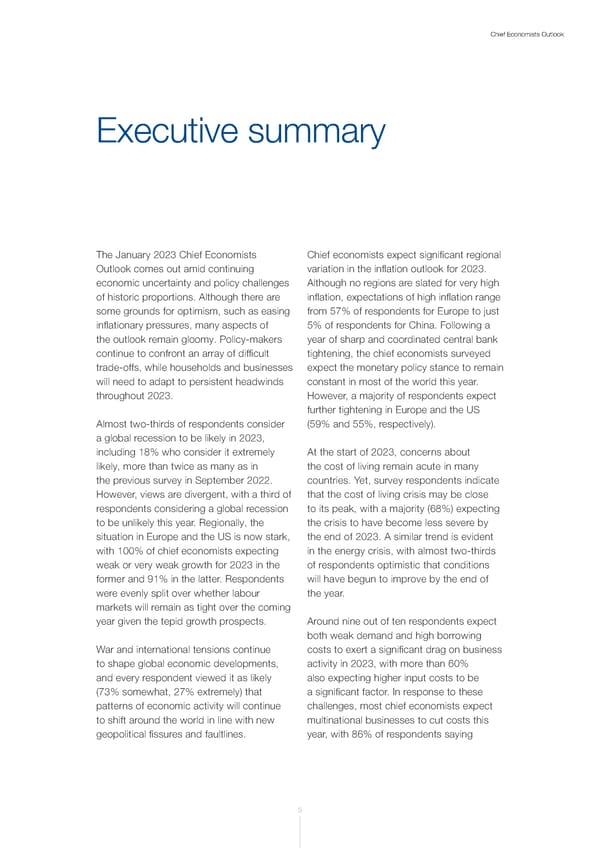5 Chief Economists Outlook The January 2023 Chief Economists Outlook comes out amid continuing economic uncertainty and policy challenges of historic proportions. Although there are some grounds for optimism, such as easing inflationary pressures, many aspects of the outlook remain gloomy. Policy-makers continue to confront an array of difficult trade-offs, while households and businesses will need to adapt to persistent headwinds throughout 2023. Almost two-thirds of respondents consider a global recession to be likely in 2023, including 18% who consider it extremely likely, more than twice as many as in the previous survey in September 2022. However, views are divergent, with a third of respondents considering a global recession to be unlikely this year. Regionally, the situation in Europe and the US is now stark, with 100% of chief economists expecting weak or very weak growth for 2023 in the former and 91% in the latter. Respondents were evenly split over whether labour markets will remain as tight over the coming year given the tepid growth prospects. War and international tensions continue to shape global economic developments, and every respondent viewed it as likely (73% somewhat, 27% extremely) that patterns of economic activity will continue to shift around the world in line with new geopolitical fissures and faultlines. Chief economists expect significant regional variation in the inflation outlook for 2023. Although no regions are slated for very high inflation, expectations of high inflation range from 57% of respondents for Europe to just 5% of respondents for China. Following a year of sharp and coordinated central bank tightening, the chief economists surveyed expect the monetary policy stance to remain constant in most of the world this year. However, a majority of respondents expect further tightening in Europe and the US (59% and 55%, respectively). At the start of 2023, concerns about the cost of living remain acute in many countries. Yet, survey respondents indicate that the cost of living crisis may be close to its peak, with a majority (68%) expecting the crisis to have become less severe by the end of 2023. A similar trend is evident in the energy crisis, with almost two-thirds of respondents optimistic that conditions will have begun to improve by the end of the year. Around nine out of ten respondents expect both weak demand and high borrowing costs to exert a significant drag on business activity in 2023, with more than 60% also expecting higher input costs to be a significant factor. In response to these challenges, most chief economists expect multinational businesses to cut costs this year, with 86% of respondents saying Executive summary
 WEF Chief Economists Outlook 2023 Page 4 Page 6
WEF Chief Economists Outlook 2023 Page 4 Page 6